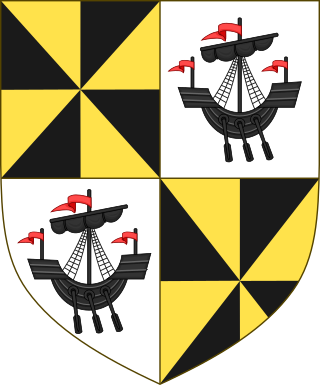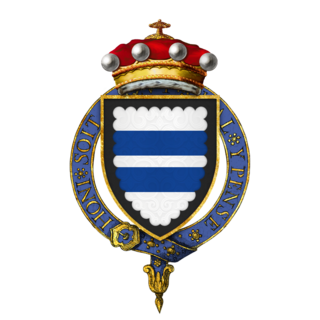Related Research Articles

John Howard, 1st Duke of Norfolk, also known as Jack of Norfolk,, was an English nobleman, soldier, politician, and the first Howard Duke of Norfolk. He was a close friend and loyal supporter of King Richard III, with whom he was slain at the Battle of Bosworth in 1485.

James III was King of Scots from 1460 until his death at the Battle of Sauchieburn in 1488. He inherited the throne as a child following the death of his father, King James II, at the siege of Roxburgh Castle. James III's reign began with a minority that lasted almost a decade, during which Scotland was governed by a series of regents and factions who struggled for possession of the young king, before his personal rule began in 1469.

Margaret of Denmark was Queen of Scotland from 1469 to 1486 by marriage to King James III. She was the daughter of Christian I, King of Denmark, Norway and Sweden, and Dorothea of Brandenburg.
The Paston Letters is a collection of correspondence between members of the Paston family of Norfolk gentry and others connected with them in England between the years 1422 and 1509. The collection also includes state papers and other important documents.

Colin Campbell, 1st Earl of Argyll was a medieval Scottish nobleman, peer, and politician. He was the son of Archibald Campbell, Master of Campbell and Elizabeth Somerville, daughter of John Somerville, 3rd Lord Somerville. He had the sobriquet Colin Mulle, Bold Earl Colin.

Archibald Douglas, 5th Earl of Angus was a Scottish nobleman, peer, politician, and magnate. Tradition has accorded him the nickname Archibald 'Bell-the-Cat' due to his association with the 1482 rebellion against James III of Scotland. He became one of the most powerful nobleman in Scotland through his influential position on the Scottish Marches, and a willingness to be involved in multiple rebellions in the reigns of James III and James IV of Scotland.
Adam Hepburn, Master of Hailes was Sheriff of Berwickshire in April 1467, and had a charter of confirmation of Dunsyre in the sheriffdom of Lanarkshire, dated 13 October 1475, being thereafter designated 'of Dunsyre'.

James Douglas, the 4th Lord of Dalkeith, was created the 1st Earl of Morton in 1458.
Thomas Boyd, Earl of Arran was a Scottish nobleman.
Robert Boyd, 1st Lord Boyd was a Scottish statesman, Lord Chamberlain of Scotland from 1467.
Sir Robert Lauder of the Bass was a Scottish knight, armiger, and Governor of the Castle at Berwick-upon-Tweed. He was also a member of the old Scottish Parliament. The Lauders held the feudal barony of The Bass, East Lothian, Edrington Castle and lands in the parish of Mordington, Berwickshire, Tyninghame in Haddingtonshire, and numerous other estates and properties elsewhere in Scotland.

Sir William Parr, KG (1434–1483) was an English courtier and soldier. He was the eldest son of Sir Thomas Parr (1405–1461) and his wife Alice, daughter of Sir Thomas Tunstall of Thurland, Lancashire.

Clan Guthrie is a Scottish clan.
Sir William Hawte was a prominent member of a Kentish gentry family of long standing in royal service, which, through its near connections to the Woodville family, became closely and dangerously embroiled in the last phases of the Wars of the Roses.
Humphrey Dacre, 1st Baron Dacre of Gilsland, was an English soldier, Cumberland landowner and peer.

Sir Alexander Napier, 2nd Laird of Merchiston was a Scottish politician and diplomat. He thrice served as Provost of Edinburgh, and served as Commissioner for Edinburgh in the parliaments of 1458, 1463, 1464, 1469, 1471 and 1473.
The Comptroller of Scotland was a post in the pre-Union government of Scotland.
James Livingston, 1st Lord Livingston was a Scottish nobleman.
References
- ↑ Accounts of the Lord High Treasurer, i. 30, &c.; George Crawfurd, Officers of State, p. 360
- ↑ Records of the Exchequer, 1474
![]() This article incorporates text from a publication now in the public domain : "Guthrie, David". Dictionary of National Biography . London: Smith, Elder & Co. 1885–1900.
This article incorporates text from a publication now in the public domain : "Guthrie, David". Dictionary of National Biography . London: Smith, Elder & Co. 1885–1900.